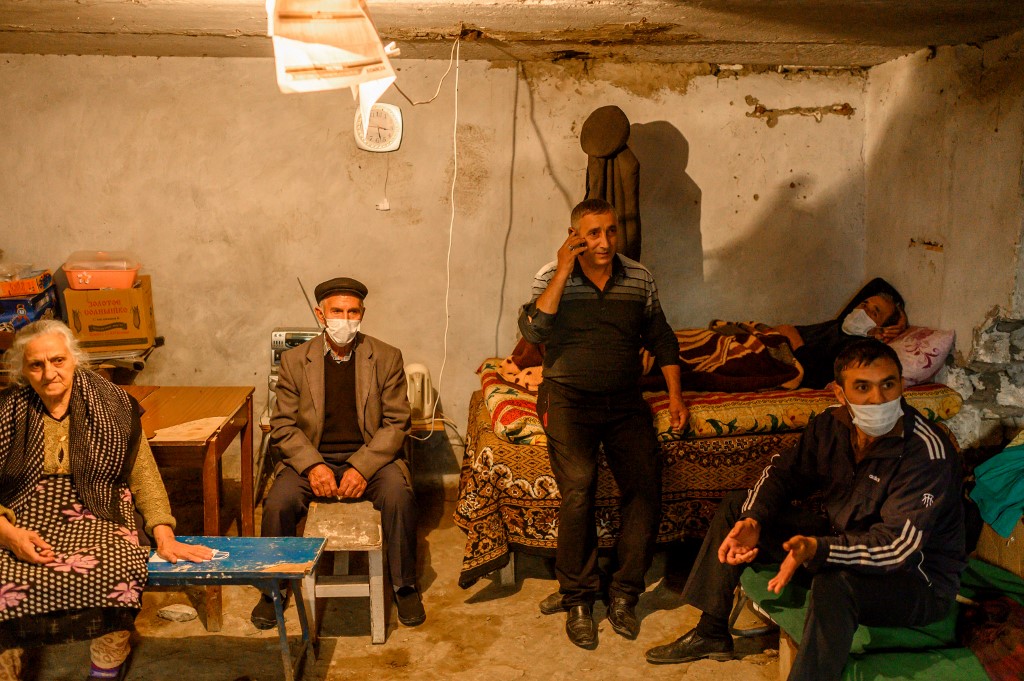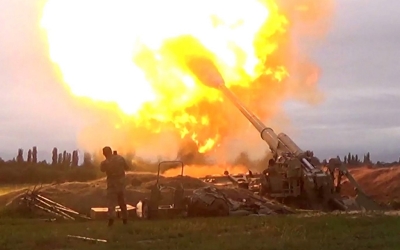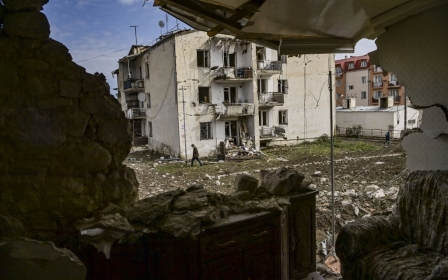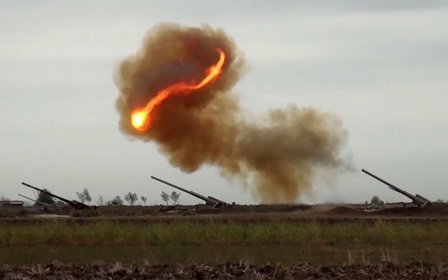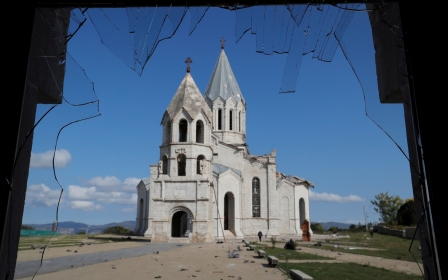Azerbaijan-Armenia conflict: Baku needs a way out of war
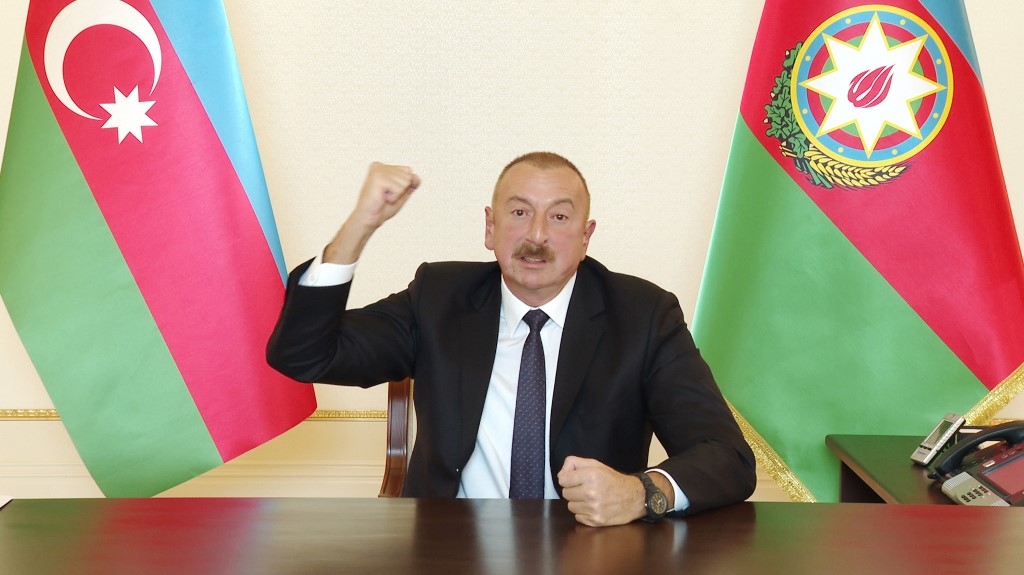
As the conflict between Azerbaijan and Armenia persists despite a Moscow-brokered ceasefire, exacting a heavy civilian toll on both sides, it is clear that Baku’s expectation of a decisive victory will not likely materialise. This presents the government of Azeri President Ilham Aliyev with stark choices.
In a recent interview with Russian media, Aliyev blamed Russian President Vladimir Putin for “saving Armenia” from the jaws of defeat, rightly claiming that Armenia is “100 percent” dependent on Russia.
But given Armenia’s membership in the Collective Security Treaty Organization (CSTO) and the Russia-led Eurasian Economic Union, in addition to Armenia’s contributions to the Russian campaign in Syria, Aliyev should not be surprised or indignant - particularly since Baku has relied extensively on moral and material support from Ankara, which is competing with Russia in Syria and Libya and, perhaps more importantly, working to safeguards its oil interests.
Security threats
Turkey has reportedly sent hundreds of Syrian mercenaries into the Nagorno-Karabakh conflict, raising alarms in neighbouring Russia and Iran. In addition, the export of Israeli arms to Azerbaijan prompted Yerevan to recall its ambassador to Israel in protest, fuelling Iran’s long-term concerns over new security threats from its northern borders.
New MEE newsletter: Jerusalem Dispatch
Sign up to get the latest insights and analysis on Israel-Palestine, alongside Turkey Unpacked and other MEE newsletters
As a result, a huge rift between Turkey on the one hand, and Russia and Iran on the other, has emerged, adding to Aliyev’s war woes.
At the core of Baku’s costly miscalculation is a misperception of how Moscow would respond to its growing insertion into the Turkish-European energy security strategy, and the parallel attempt by Nato to expand to the Caspian and Black Sea regions, traditionally considered Russia’s sphere of influence.
Having raised the population's expectations of a military victory ... Aliyev's government now faces the quandary of finding a face-saving exit
Even the Trump administration, widely accused of being deferential towards the Kremlin, has not been shy about Nato’s strategic designs for the South Caucasus. This region has been increasingly polarised along pro- and anti-West fault lines, with the ferocity of Cold War winds still blowing across its geostrategically important landscape.
Any expectation that Russia would passively observe a western strategy to wrest Azerbaijan into its orbit in a zero-sum energy game, alongside a push to bring Georgia into Nato and support for the brewing revolution in Belarus, has proved to be delusional. It is thus unsurprising that Putin maintained a meaningful silence during the first week and a half of the conflict; he saw the value in a renewed conflict that would heighten western energy security concerns and potentially culminate in enhancing Russia's influence.
His belated call for a ceasefire blended lip service to Azeri sovereignty over Nagorno-Karabakh with a serious intent to defend CSTO member Armenia within its internationally recognised borders, thus severely curtailing Azerbaijan’s scope of military action. This is tantamount to asymmetric warfare, whereby Armenians can target pipelines in Azerbaijan with relative impunity.
Rude awakening
There is an emerging narrative, particularly in Turkish media, that Armenia’s shelling of Tovuz in July, as well as recent attacks since the ceasefire, highlight the vulnerability of the South Caucasus energy route. This, in turn, poses a dilemma: how can this insecurity be addressed without making major concessions to Russia?
The answer may require a pledge from Baku and Tblisi to refrain from joining Nato for the foreseeable future, and to revise their energy policies in favour of a non-zero-sum approach, whereby, for example, Russia could join such projects as the Shah Deniz pipeline to export its energy - similar to Iran, which has a 10 percent share in the second phase of this project, thanks to a US sanctions waiver.
Absent such major concessions, in light of the new internationalisation of the old dispute in Nagorno-Karabakh, it may be necessary to revamp the Minsk Group, tasked with dealing with the conflict, to expand its membership and include Iran, a stakeholder due to its proximity.
It is, however, difficult to see how a narrowly focused mediation on Nagorno-Karabakh could succeed. There is little evidence so far that Baku’s rude awakening to the shortfalls of its military campaign have led to realistic adjustments. This failure could prove disastrous given the high costs of prosecuting an unwinnable war, particularly if there are also severe interruptions to the flow of Azeri oil and gas.
This could deal a severe blow to the Azeri government, already hit by the double whammy of falling energy prices and the Covid-19 pandemic. But having raised the population’s expectations of a military victory to compensate for a humiliating past defeat at the hands of Armenia, Aliyev’s government now faces the quandary of finding a face-saving exit.
The lesser evil
Armenian Prime Minister Nikol Pashinyan has signalled Yerevan’s readiness for “mutual concessions” in order to reach a lasting peace with Azerbaijan. But the devil is in the detail, and on the part of Armenia and Russia, various frameworks appear to be under consideration.
Tit-for-tat territorial concessions in exchange for refreezing the conflict could entail the return by Armenia of some, if not most, of the seven areas adjacent to Nagorno-Karabakh occupied by Armenia since the early 1990s. These areas have been a focus of Azerbaijan’s military campaign, so far with only token rewards, such as in Jabrayil.
Another concession could be the establishment of a corridor connecting Azerbaijan to the autonomous republic of Nakhchivan, in exchange for Armenia’s control over the vital Lachin corridor connecting Armenia to Nagorno-Karabakh. Concessions on the partial repatriation of war refugees, a new peacekeeping force, and cohabitation in Nagorno-Karabakh are also within the realm of possibility.
Moscow may soon find it necessary to lean on Yerevan, and on the de facto authorities in Stepanakert, to retreat from the notion of independent statehood for the disputed territory, perhaps in favour of an autonomous region along the lines of Nakhchivan. Aliyev also has the leverage that he could pledge to get rid of the Turkish-sponsored mercenaries, who pose a security risk to both Russia and Iran.
Ultimately, however, concessions from Yerevan will likely fall short of appeasing Baku’s maximalist war demand of regaining full control over Nagorno-Karabakh. Aliyev’s best bet now is to let pragmatism take the upper hand, lick his wounds and go for the lesser evil of an exit strategy that refreezes the conflict before it consumes the country.
The views expressed in this article belong to the author and do not necessarily reflect the editorial policy of Middle East Eye.
Middle East Eye delivers independent and unrivalled coverage and analysis of the Middle East, North Africa and beyond. To learn more about republishing this content and the associated fees, please fill out this form. More about MEE can be found here.


